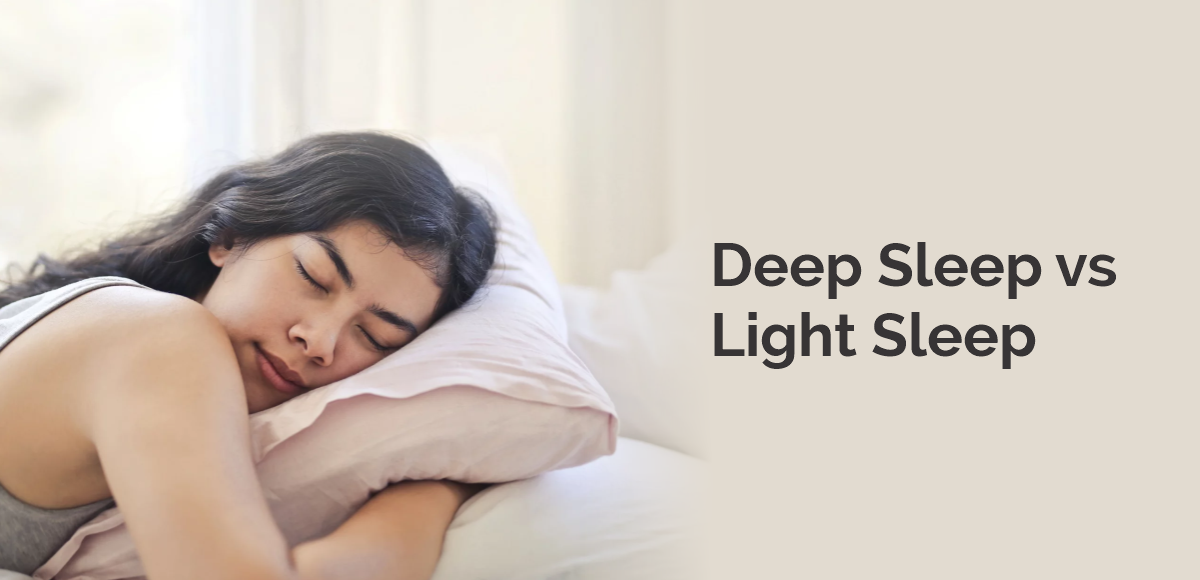

We hit the pillow and deep dive into sleep but did you know the science behind it? Did you know that the concept of Deep Sleep vs Light Sleep exists? This dreamy read today will enlighten you about our sleep patterns and how poor sleep pattern aligns with PCOS.
In sleep, rapid eye movement (REM) sleep is one of two major categories, and each category includes distinct stages. A full night's rest entails cycling through some of these stages several times before getting up in the morning for humans, who cycle through them in a regular rhythm when sleeping.
Consult a Psychiatrist with Assurance if sleep eludes you!
There may be ways to sleep better and deeper each night, allowing you to come out feeling more relaxed and rejuvenated. Prior to entering REM sleep, the body goes through three non-REM sleep stages:
Are you ready to know about Deep Sleep vs Light Sleep?
The initial stage:
During this moment, the minds and bodies change out of a state of activity to sleepiness. Usually, a few minutes pass during this time period, and sleep is light. People may find it easier to get out of this period of sleep than others.
Stage one is when the body begins to slow down its rhythms. There is a noticeable decrease in heart rate and respiration rate, and the eyes start to relax as well. Muscles are also relaxed. However, they may twitch from time to time.
As the body relaxes, so makes the mind. As brain activation and sensory stimulation decrease, the brain waves start to slow down in the second stage.
Stage Two:
When the body begins to move from light sleep to deep sleep, it represents the second phase of non-REM sleep. Cerebral Disorders and Stroke transcribes in those humans spend the majority of their sleep cycle in this period.
The heartbeat, heart, and respiratory rate are slowed even further in the body as a result of this. As the muscles loosen even further, so do the eye movements. Also, the body's core temperature drops.
This stage comprises tiny bursts of brain electrical signals, but the neural activity slows down even more.
Stage Three:
Stage three of non-REM sleep is known as deep sleep, slow-wave sleep, or slumber. Although the body goes through a few stages of sleep over the night time, the third stage takes place over a longer amount of time in the early hours.
During this stage of sleep, the body's heart and breathing rates are at their lowest. There is also a great deal of relaxation in the muscles and eyelids, and the neural activity slows even further.
When sleep disorders like sleepwalking develop, waking someone up can be extremely difficult.
Hope the above read helped you understand Deep Sleep vs Light Sleep!
Awakening from a dream state of consciousness
The last stage of sleep is known as REM sleep. About 20 - 30 minutes after falling asleep, the body begins to enter REM sleep for the first time.
The eyes are drawn back and forth under closed eyelids during this period of sleep. This stage of sleep is the closest to being awake than the others.
As sleep progresses into REM, the brain's wave patterns begin to mimic those of a wakeful state—the rate of one's heartbeat and respiration quicken.
In addition to the REM stage, this is also the time during which most people dream. To keep the body from enacting dreams, the brain temporarily paralyzes the arms and legs and causes them to twitch.
PCOS & Sleep:
According to clinical studies, women with PCOS are more likely than non-PCOS comparison groups to suffer from sleep disorders such as sleep apnea and daytime sleepiness. Few population-based research has provided evidence in favor of this claim. The majority of overweight/obese women with PCOS have sleep problems. Sleep issues can arise in women with PCOS who are a healthy weight as well. PCOS may cause sleep problems via many, perhaps bidirectional routes.
Consult a Doctor with assurance and read more about our PCOD program here
PCOS likely causes alterations in the secretion of cortisol and melatonin, which could indicate altered hypothalamic-pituitary-adrenal function. Hyperandrogenemia and insulin resistance are also part of the pathophysiology of PCOS. Women with PCOS are more prone to have anxiety and depression, smoke, drink alcohol, and engage in sedentary behaviours due to the unpleasant side effects they encounter. These behaviors may also have a role in the development of PCOS. It's not yet known how sleep disorders influence the health of PCOS women, but both are linked to long-term declines in cardiometabolic health and an enhanced risk of type 2 diabetes.
Also read, myths that cloud PCOS here
Women with PCOS will likely benefit in the short and long term from receiving interdisciplinary health care that includes diagnosing and treating sleep issues.
How can Assurance help me?
Assurance by NanoHealth provides Disease Management Programs, including PCOD care, infertility, Heart care, etc.
Why us? Our AI-driven initiative helps timely identification, diagnosis, and treatment by pairing you with the proper care providers.
Our disease care management programs include:
- Regular interactions with your health coach for treatment adherence.
- Periodic doctor consultations to ensure effective treatment.
- Routine blood tests to track the progress and improvements.
Book an appointment with fertility specialists from anywhere & anytime today to get a carefully assessed and curated meal plan to headstart your healthy journey. Head over to our website nhassurance.com and consult a specialist today!
